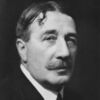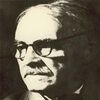
The civilized but uneducated man, in the sense I have shown, with modern means of destruction, is incomparably more dangerous than the cave dwellers with their stone axes.
(The writer) is a more sensitive and vibrant chord of the people's soul, and can more strongly express the aspirations of society, feeling more deeply the virtues that can raise a people, and the weaknesses that can hold it in place or bring it down.

Works of art...vigorous signs that humanity makes itself.
The history of a literary genre is almost confounded with our history, or at least with our destiny.

Priceless treasures of tender sentiments, of ancestral lore and above all of poetic beauties full of originality and unparalleled in foreign literatures, our folk poems compose a national treasure, worthy of being brought to light as a title of glory for our nation.

I believe that poetry, in addition to the necessary condition to please, the condition of its existence, is obliged to express the needs of society and to awaken the beautiful and noble feelings that elevate the soul through moral and divine ideas.

The difference between the practical meanings that we give things and the meaning that only poets find in them, is that the former are fragmentary meanings, abstractions and uses of the object, isolation and use, while the poetic meaning is nothing but that echo of feeling whole and radical of the poet before the world and life... The poet carries the meaning within himself.
Although the validity of a work is undoubtedly entirely dependent on its intrinsic capacity to produce aesthetic reactions in the beholder independent of the process of elaboration through which it has passed, it is no less true that this capacity to understand it.
A poem is a message that starts from a concrete and individual spirit - the author's, to another virtual and also individual - the reader's.
Without life experience, which serves as matter or material, neither a work of art nor an artistic construction is possible; but the nature of the work of art is not necessarily conditioned by the nature of life experiences, the artist maintaining his free spirit, to form a new world from that detritus of his own experiences accumulated throughout his whole life, decanted experiences, placed in the depth of the heart... And this new world, as such, is entirely due to the creative forces of the artist; it is an invention not a passive reflex; a painting, not a photograph; a free creation, not an external unconditional product...
In literary works, the data of experience and life are changed through the magical alchemy of a free creative spirit, the documentary facts having no greater determining power than the palette for the painter, the instruments for the musician or the block of marble for the sculptor...
Documentary facts provide the opportunity, but do not determine the meaning of our worldview.
Metaphors indirectly outline the poetic space, the emotional atmosphere that the poet creates for himself, like the donut silkworm, in which he closes his current world; they indicate the sentimental tension that exists between the poet and his objects...
No object finds its place in the poem, other than through the emotion in which the poet envelops it. But all the objects that fall under this magical halo of feeling which the poet releases in the fever of creation, whether they belong to his inner life or to the outer world, become transparent to his penetrating intuitive vision, giving their meaning...
Contemplating a reality circumscribed by himself, the poet penetrates it so deeply with his penetrating gaze that he manages to give us a sentimental intuition about the world and life, thereby raising the humble concrete reality of existence to the high plane of ideal realities and essences. From life to poetry.
Poetry is not a relief or simply an effusion of a feeling, of a structure... How many of us do not quench in verse the urge to talk about our love? But this has nothing to do with poetry.

The artist, like the writer, must belong to his time: only on this condition will his works be transmitted to posterity. He must belong to his country, only then will he be amazing. He must express his views, if he is to be true and admired by thinkers.

In any work of art, the artist exposes something from his soul; an expression, a thought, a smile are signs of the artist's thought.
The artist never gives us reality as it is, as he sees it, through the prism of his ideal.

To express the inexpressible, to give form to things in form... to awaken sleeping sensibilities through rhythm, to make words a cradle with which to sleep the pains of others, to draw a smile on a mouth that has long forgotten to laugh, through a happy correspondence of images or sounds, and of all these to give birth to the beautiful, to bestow on your contemporaries, can anything be more sublime?

The best way to be classical and measured is to be the poet of your time and not to sacrifice anything that the ancients could teach us.
The Poet: ...(one) whose struggle tends to open new paths in the inner and outer universe.

The shortcoming, when it comes to poetry, is to want to enact laws, draw up a cadastre, draw borders; poetry laughs at everything and is always reborn, especially where it was decreed not to exist.
I believe that poetry begins, especially when we understand in ways that are not necessarily of vulgar understanding...
Poetry makes it easier for me to touch reality in a more direct way, through a kind of raccourci, in which the clearing surprises. Poetic emotion is the sign of the acquired knowledge of the stage-suppressing consciousness.

...If there was only that, copy and shorthand, realism could never have founded a literary school, it would have meant nothing. Realism is an inspiration. What makes it all valuable is precisely its incessant transparency, are the figures, visible with the mind, that thought describes inside it, strictly geometrizing... Nature gives matter; man stylizes it.
I think there is no need to say that poetry is a necessity of everyone's soul, in whatever direction it manifests itself. It is the sweet or bitter burden of each of us. It remains to decipher how written poetry should be, especially that so-called poetry which saddens me and which is more like prose without head and end - and unfortunately without substance.
Writing is not entertainment. Martyrdom, patience, selflessness and many sacrifices.
Poetry preserves for the souls who share it, in the professional work of the engineer, the doctor, the lawyer, that youth of expensive naiveties and trusts in life and in the bearers of life...
It (poetry) makes possible the intellectual resonance and suaveness of existence, removes the skepticism that collapses men, guarantees to culture a continual refreshment, and to man the inhabitant of a great wider daily miracle, the faculty of feeling.